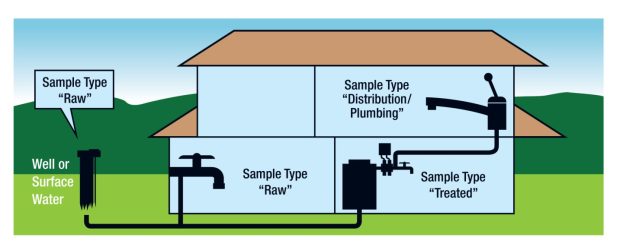Private wells are the perfect solution for households in many rural areas, especially in remote locations without connection to the city or municipal water system.
Estimates reveal that over 43 million people in the United States rely on residential wells to supply reliable drinking water. The number could be higher, considering that some users tap these sources to augment their household water supply or as a backup source for other domestic needs.
If you’re planning to have one in your home, having professionals on your side is crucial. It also helps to understand your options and prepare for the changes discussed below.

Primary well-water types
To many, water wells are just holes dug in the ground to facilitate access to groundwater. But care should be taken to ensure your location is safe for drinking water extraction. Note that the quality of water generated by the well depends on aquifer quality, so hiring professionals to install and maintain it is highly recommended.
There are three primary types of private wells, according to the Environmental Protection Agency (EPA):
- Dug wells: Ancestors have been making wells through this method. By digging deep enough into the ground, users can access the aquifer. After a hole is drilled, certain materials—like concrete, bricks, or stones—are lined to prevent the well from collapsing.
However, this method is no longer advisable for household consumers today, especially those looking to use the well as the primary source of drinking water. Dug wells are the most unsafe option because they’re prone to contamination caused by surface water.
- Driven wells: For homes with aquifers near the surface, driven wells may be a good solution. Its installation entails placing a pipe into the ground with a depth of up to 50 feet. While safer than dug wells, contaminants can still enter the water drawn from driven wells, especially if they’re not properly sealed.
- Drilled wells: This solution is the most efficient among the available options, and for a good reason. A drilled well project involves using advanced machines to install continuous casing while digging a hole of up to 1,000 feet into the ground. Besides the case, a strong grouting material is also used to minimize contamination.
Proper well construction will depend on the conditions in your location. Contact the health department or the local water system group affiliated with the National Ground Water Association (NGWA) before drilling occurs. Generally, a residential well installation could cost a homeowner anywhere from USD$3,500 to USD$15,000, depending on the system’s depth.
How wells water solutions change your water system
While well water system installation may be a substantial investment, consumers are expected to enjoy the benefits and be reminded to consider safety and sustainability, as discussed below.
1. Augments water system supply
About 90% of freshwater supplies in the US can be found underground. Still, only 27% of the country’s water supply comes from underground sources, according to facts gathered by National Ground Water Association (NGWA).
A safe well water system can help reduce this underutilization. A system that produces enough water supply can augment or become the main residential water source, depending on how much it can extract from the ground and the water quality in the said location. Similarly, some companies provide different solutions to boost supply, increase water pressure, and address other problems associated with sourcing water from the well.
2. Increases water system control
According to Scientific American, there’s an impending drinking water crisis in the US, the signs of which include water interruptions and contamination. These deficiencies have been felt sporadically in some states over the last few years. In addition, experts cite overpopulation as one of the main reasons for water supply problems, as the source can no longer keep up with the demand. More than reminding people to conserve water, this is a fitting signal for consumers to find alternative ways to extract groundwater.
When something goes wrong with the municipal water source, your water system will only be slightly affected if you have well water solutions. Because well water use isn’t regulated, you can continue using it for other applications that homeowners’ associations may otherwise restrict, like landscaping. This means greater control over your water source and supply—from testing, installing, using, and maintaining the system.
3. It makes water systems reliable even in emergencies
Besides taking more control over your water consumption, well solutions can also increase your system’s resiliency. While droughts may result in lower water pressure, installing pressure-boosting devices can help you address the issue, increasing your well’s water extraction and generation capacities.
Furthermore, extra water storage can be used during water interruptions and natural disasters when the water supply may be temporarily cut off because of the damage. With well water solutions from companies like EPP Well Solutions, you’ll have a more reliable source and get more value from your well, even in the most challenging situations.
4. Keeps your water system safer
Ideally, the tap water is kept safe by undergoing treatment, which users will have to pay for regularly. This often entails putting chemicals like chlorine for disinfection. Similarly, well water usually contains natural minerals and is regularly tested for health risks. It also undergoes specific treatments to soften hard water and remove contaminants.
Periodic water quality testing in these settings makes water as safe as possible, but you’ll get more assurance if you request the tests or have these solutions at home. Such is the case when you have well water solutions with built-in treatment systems. With it, you’re always assured of access to high-quality and safe drinking water anytime.
This is why you should always keep this system in good condition. Indiana residents can rely on professional well repair in Indianapolis to ensure their well water systems are functioning optimally and delivering safe, clean water to their homes. More importantly, regular maintenance and prompt repairs can prevent potential issues from escalating, saving you both time and money in the long run.
5. Helps manage water system use
City or municipal water consumers pay monthly bills for their usage. A household spends more than USD$1,000 annually for water consumption, based on estimates from the Environmental Protection Agency.
Having well water solutions allows consumers to manage their consumption by shifting how they use their city-supplied water system—helping reduce overall consumption and water bills. For instance, using well instead of tap water in your garden saves costs and reduces bills. You can also save on power charges, as it costs less energy to draw water from a private well instead of transporting it from the city’s water supply.
Concluding thoughts
Well water system installation may sound simple, but you should consider safety and quality before having one. Hiring professionals can help ensure the water source is safe, and the project is done correctly. In addition, these contractors can also provide the best solutions to make your water system safer, more reliable, and more efficient, allowing you to control water supply use and management sustainably.



